By Shaykh Dr. ‘Abd al-Salām Ibn Burjis Ibn Naṣir Āl-‘Abd al-Karīm
“Generation after generation was destroyed by wars because a man would seek the aid of his tribe, even if he was upon falsehood and the likes of that from trivial causes and despicable motives.
So Islam came to erase all of these loathsome outward practices in their lives when it made them equal with regards to the rights, and it made their slogans of allegiance to, “al-Islam”. And Islam made them excel over one another due to taqwa (righteousness) and obedience to Allah. So there is no excellence for an Arab over a non-Arab, nor is there any excellence for a non-Arab over an Arab, nor for a white person over a black one, nor for a black person over a white one, except due to taqwa.”
The Seventh Hadith
From Abi Nadrah al-Mundhir Ibn Malik Ibn Qut’ah who said, ‘Someone who heard the sermon of the Messenger of Allaah (صلى الله عليه وسلم) in the middle of the days of al-Tashriq informed me that he said,
“O people! Indeed, your Lord is one and your father is one. Indeed, an Arab has no excellence over a non-Arab, nor does a non-Arab have any excellence over an Arab, nor does a white person have any excellence over a black one, nor does a black person have any excellence over a white one, except through taqwa. Have I conveyed the message?” They replied, ‘You have conveyed it O Messenger of Allaah (sallallahu ‘alaihi wasallam).’” 1
It is related by Imaam Ahmad (d.241) in al-Musnad. Al-Haythami said in al-Majma’, “Its narrators are the narrators of the Sahih.”2
And Shaykh al-Islam Ibn Taymiyyah said, “The isnad is sahih.”3 Indeed, al-Bayhaqi (d.457H) related it in al-Shu’ab, from Abi Nadrah, from Jabir Ibn ‘Abdullah (رضي الله عنه). However, al-Bayhaqi said after it, “And there are some unknown narrators in this isnad.”
So when the Lord is One and the father of mankind is one, then this does not leave any room for claims of excellence without the taqwa of Allah (Azza wa Jal). That is, no consideration is given to such claims. And in this hadith, excellence is confined to taqwa and it is negated in anything other than taqwa.4
Footnotes
1 Sahih: Related by Ahmad in al-Musnad (5/411), ‘Abdullah Ibn al-Mubarak in al-Musnad (no. 239) and al-Bayhaqi in Shu’ab al-Iman (4/289). Refer to al-Fath al-Rabbani (2/226) of al-Sa’ati. It was authenticated by al-Albani in Ghayah al-Maram (no. 313).
2 Refer to al-Majma’ al-Zawa’id (3/266) of al-Haythami.
3 Refer to Iqtida’ al-Sirat al-Mustaqim (1/368) of Ibn Taymiyyah.
4 Refer to the speech of al-Shawkani (d.1250H) in explanation of this hadith in al-Fath al-Rabbani (12/226) of al-Sa’ati. And it is taken from Nayl al-Awtar (5/165) of al-Shawkani.
Source: Prophetic Ahadith in Condemnation of Racism, The Noble Shaykh Dr. Abl-al-Salam Ibn Burjis Ibn Nasir Al-‘Abd al-Karim (d.1425H), Translation by Maaz Qureshi, Sunnah Publishing, The Seventh Hadith,pp.28-29.
» Book Review: Prophetic Ahādith in Condemnation of Racism – al-Rahmaniyyah https://t.co/awPPBu3ful
— Malik Al-Akhdar (@IbnAkhdar) September 22, 2017

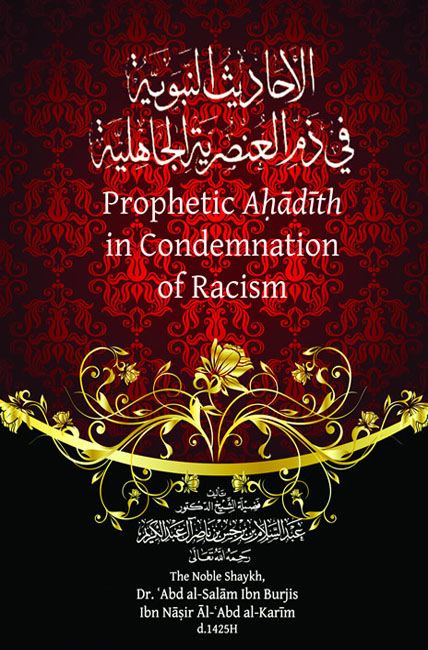
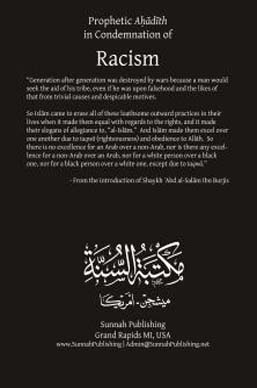
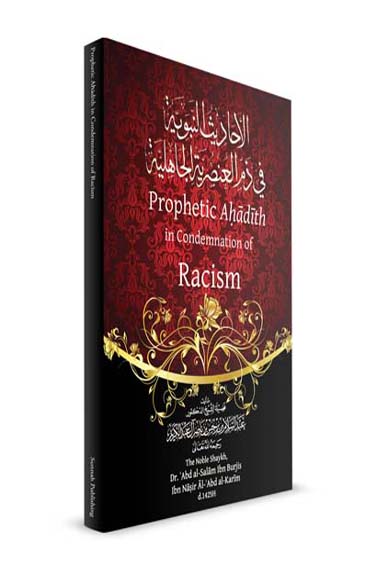
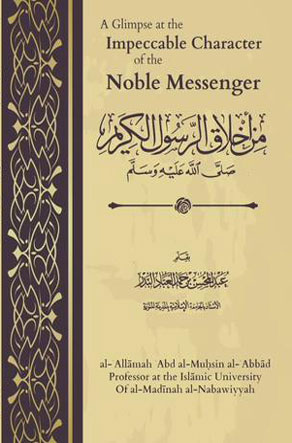
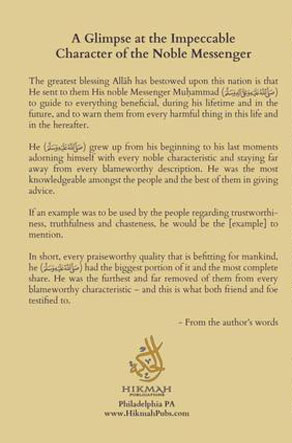









Reviews
There are no reviews yet.